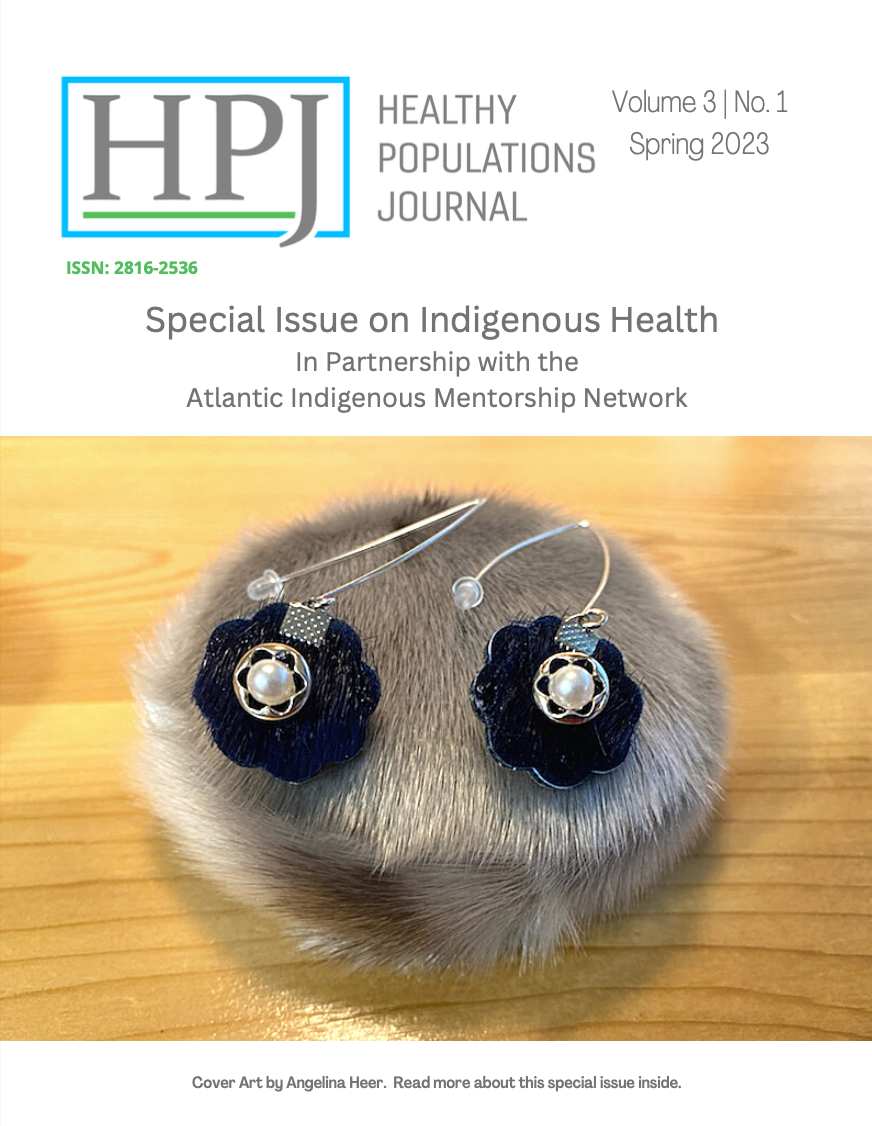Embodied in Indigenous Research: How Indigeneity, Positionality, and Relationality Contribute to Research Approaches and Understanding
DOI :
https://doi.org/10.15273/hpj.v3i1.11475Mots-clés :
Indigenous research methodologies, Indigenous students, research, lived experienceRésumé
Objectives: As the presence of Indigenous Peoples, world views, perspectives, and teachings continues to grow within academia, the institutional narrative regarding Indigenous approaches to knowing, doing, and being evolves and expands. We would like to contribute to this shifting narrative. Introduction: We are a diverse group of trainees invited into an Indigenous-led research project, entitled IndWisdom, that is exploring the context-mechanism-outcome relationships of Indigenous research. By conducting two parallel study components—an Indigenous-informed realist review and case studies—the larger IndWisdom project aims to advance Indigenous Peoples‘ sovereignty and rights related to how Indigenous Knowledges are centred in research. Through the process of this research, we have come to the understanding that Indigenous Knowledges and Indigenous Knowledge Systems are contextualized and dynamic in nature and are embodied and interconnected in all aspects of one‘s lived experience, language, traditions, and culture. Methods: As a collective, the trainees were supported to participate in a sharing circle to introduce ourselves and reflect on how our positionality and understanding of who we are impacts our approach to engaging with research. Results: While we span different nationhoods and time zones, we share how we have fostered virtual spaces that respect each other's perspectives and approaches as well as honour our own Indigenous world views and allied identities. Discussion: In the same way that our realist review involves recording and analyzing context-mechanism-outcome details of other peoples‘ studies, our paper provides the context of who we are as co-authors, our mechanisms (approaches) of engaging with each other and the IndWisdom study content, and outcomes from our ways of knowing and doing research.
Keywords: Indigenous, research, typology/methodology, lived experience, Indigenous research methodologies, ways of knowing
Références
Bartlett, C., Marshall, M., & Marshall, A. (2012). Two-Eyed Seeing and other lessons learned within a co-learning journey of bringing together Indigenous and mainstream knowledges and ways of knowing. Journal of Environmental Studies and Sciences, 2(4), 331–340. https://doi.org/10.1007/S13412-012-0086-8
Battiste, M. (2005). Indigenous knowledge: Foundations for First Nations. WINHEC: International Journal of Indigenous Education Scholarship, 1–17. https://journals.uvic.ca/index.php/winhec/article/view/19251
Battiste, M. (2013). Decolonizing education: Nourishing the learning spirit. Purich Publishing.
Bourque Bearskin, R. L., Cameron, B. L., King, M., & Weber-Pillwax, C. (2016). Mâmawoh Kamâtowin, “Coming together to help each other in wellness”: Honouring Indigenous nursing knowledge. International Journal of Indigenous Health, 11(1), 18–33. https://doi.org/10.18357/ijih111201615024
Brascoupé, S. (2002). The end of sustainability. Biodiversity, 3(3), 29. https://doi.org/10.1080/14888386.2002.9712598
Brascoupé, S., & Endemann, K. (1999). Intellectual property and Aboriginal people: A working paper. Indian and Northern Affairs Canada. https://www.wipo.int/export/sites/www/tk/en/databases/creative_heritage/docs/ip_aboriginal_people.pdf
Brascoupé, S., & Mann, H. (2001, June). A community guide to protecting Indigenous Knowledge. Indian and Northern Affairs Canada. https://publications.gc.ca/collections/Collection/R2-160-2001E.pdf
Fast, E., Lefebvre, M., Reid, C., Deer, B. W., Swiftwolfe, D., Clark, M., Boldo, V., Mackie, J., & Mackie, R. (2021). Restoring our roots: Land-based community by and for Indigenous youth. International Journal of Indigenous Health, 16(2), 120–138. https://doi.org/10.32799/ijih.v16i2.33932
Hart, M. A. (2010). Indigenous worldviews, knowledge, and research: The development of an Indigenous research paradigm. Journal of Indigenous Voices in Social Work, 1(1A). https://journalhosting.ucalgary.ca/index.php/jisd/article/view/63043
Healey, G. K., Noah, J., & Mearns, C. (2016). The Eight Ujarait (Rocks) Model: Supporting Inuit adolescent mental health with an intervention model based on Inuit ways of knowing. International Journal of Indigenous Health, 11(1), 92–110. https://doi.org/10.18357/ijih111201614394
Hunter-Porter, N., Burns, N., Benoit, A., Auger, J., Maddox, R., Jull, J., Linton, J., Nemeth, J., Brascoupé, S., Préfontaine, N., Simon, D., Lanceleve, T., Herkimer, J., Weber-Pillwax, C., George, N., Friesen, M.,
Bourque Bearskin, L., & Morton Ninomiya, M. (2023). How Indigenous Knowledge Systems and Indigenous Knowledges are centered in research: An Indigenous-informed realist review protocol [Manuscript submitted for publication]. Department of Health Sciences, Wilfrid Laurier University.
Kimmerer, R. W. (2013). Braiding sweetgrass: Indigenous wisdom, scientific knowledge, and the teachings of plants. Milkweed Editions.
Ljubicic, G., Okpakok, S., Robertson, S., & Mearns, R. (2018). Uqsuqtuurmiut inuita tuktumi qaujimaningit (Inuit knowledge of caribou from Gjoa Haven, Nunavut): Collaborative research contributions to co-management efforts. Polar Record, 54(3), 213–233. https://doi.org/10.1017/S0032247418000372
Minthorn, R. S., & Nelson, C. A. (2018). Colonized and racist Indigenous campus tour. Journal of Critical Scholarship on Higher Education and Student Affairs, 4(1), 73–88. https://ecommons.luc.edu/cgi/viewcontent.cgi?article=1087&context=jcshesa
Ocholla, D. (2007). Marginalized knowledge: An agenda for Indigenous Knowledge development and integration with other forms of knowledge. International Review of Information Ethics, 7, 236–245. https://doi.org/10.29173/irie26
Roher, S. I. G., Yu, Z., Martin, D. H., & Benoit, A. C. (2021). How is Etuaptmumk/Two-Eyed Seeing characterized in Indigenous health research? A scoping review. PLOS ONE, 16(7), Article e0254612. https://doi.org/10.1371/JOURNAL.PONE.0254612
Semali, L. M., & Kincheloe, J. L. (Eds.). (1999). What is Indigenous Knowledge? Voices from the academy. Routledge. https://doi.org/10.4324/9780203906804
Shultz, L., Kelly, J., & Weber-Pillwax, C. (2009). The location of knowledge: A conversation with the editors on knowledge, experience, and place. Alberta Journal of Educational Research, 55(3), 335–350. https://doi.org/10.11575/ajer.v55i3.55331
Smylie, J., Harris, R., Paine, S.-J., Velásquez, I. A., Nimatuj, & Lovett, R. (2022). Beyond shame, sorrow, and apologies—action to address Indigenous health inequities. BMJ, 378, o1688. https://doi.org/10.1136/BMJ.O1688
Weber-Pillwax, C. (1999). Indigenous research methodology: Exploratory discussion of an elusive subject. Journal of Educational Thought, 33(1), 31–46. https://doi.org/10.11575/JET.V33I1.52552
Wemigwans, J. (2018). A digital bundle: Protecting and promoting Indigenous knowledge online. University of Regina Press.
Wilk, P., Maltby, A., & Cooke, M. (2017). Residential schools and the effects on Indigenous health and well-being in Canada—A scoping review. Public Health Reviews, 38, Article 8. https://publichealthreviews.biomedcentral.com/articles/10.1186/s40985-017-0055-6
Witt, N., & Hookimaw-Witt, J. (2003). Pinpinayhaytosowin [the way we do things]: A definition of Traditional Ecological Knowledge (TEK) in the context of mining development on lands of the Attawapiskat First Nation and its effects on the design of research for a TEK Study. Canadian Journal of Native Studies, 23(2), 361–390. https://cjns.brandonu.ca/wp-content/uploads/23-2-cjnsv23no2_pg361-390.pdf


